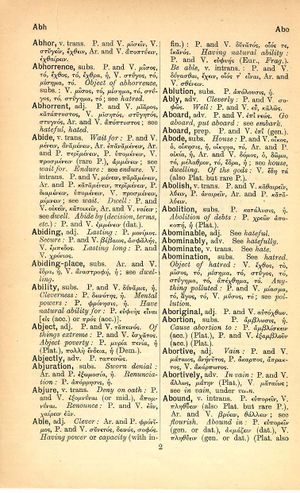abound: Difference between revisions
From LSJ
ἆρ' ἐς τὸ κάλλος ἐκκεκώφηται ξίφη → can it be that her beauty has blunted their swords, can it be that their swords are blunted at the sight of her beauty
(CSV2) |
m (Woodhouse1 replacement) |
||
| Line 1: | Line 1: | ||
{{Woodhouse1 | {{Woodhouse1 | ||
|Text=[[File:woodhouse_2.jpg|thumb|link={{filepath:woodhouse_2.jpg}}]] | |Text=[[File:woodhouse_2.jpg|thumb|link={{filepath:woodhouse_2.jpg}}]] | ||
===verb intransitive=== | |||
P. εὐπορεῖν, V. πληθύειν (also | [[prose|P.]] [[εὐπορεῖν]], [[verse|V.]] [[πληθύειν]] (also [[Plato]] but rare [[prose|P.]]). [[Aristophanes|Ar.]] and [[verse|V.]] [[βρύειν]], [[θάλλειν]]; see [[flourish]]. | ||
[[abound in]]: [[prose|P.]] [[εὐπορεῖν]] (gen. or dat.), [[ἀκμάζειν]] (dat.), [[verse|V.]] [[πληθύειν]] (gen. or dat.) ([[Plato]] also but rare [[prose|P.]]), [[πλήθειν]] (gen.), [[Aristophanes|Ar.]] and [[verse|V.]] [[βρύειν]] (gen. or dat.). | |||
[[flow with]]: [[prose|P.]] and [[verse|V.]] [[ῥεῖν]] (dat.). | |||
[[let the means of life abound]]: [[verse|V.]] [[περιρρείτω βίος]] ([[Sophocles|Soph.]], El. 362). | |||
[[abounding in]]: [[verse|V.]] [[φλέων]] (dat.); see [[rich in]]. | |||
}} | }} | ||
Revision as of 08:51, 20 May 2020
English > Greek (Woodhouse)
verb intransitive
P. εὐπορεῖν, V. πληθύειν (also Plato but rare P.). Ar. and V. βρύειν, θάλλειν; see flourish.
abound in: P. εὐπορεῖν (gen. or dat.), ἀκμάζειν (dat.), V. πληθύειν (gen. or dat.) (Plato also but rare P.), πλήθειν (gen.), Ar. and V. βρύειν (gen. or dat.).
flow with: P. and V. ῥεῖν (dat.).
let the means of life abound: V. περιρρείτω βίος (Soph., El. 362).
abounding in: V. φλέων (dat.); see rich in.

